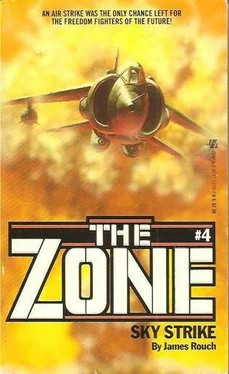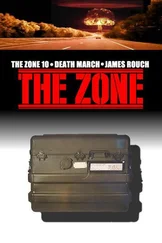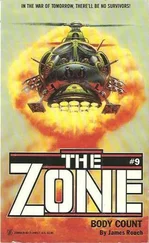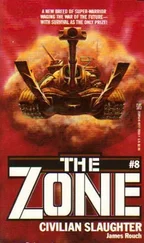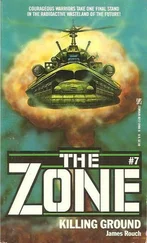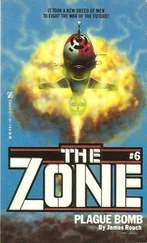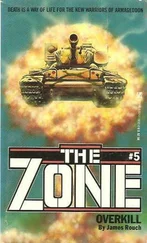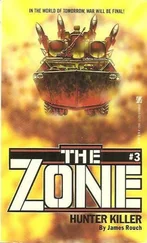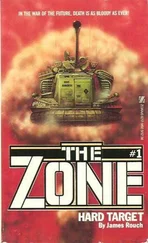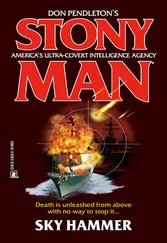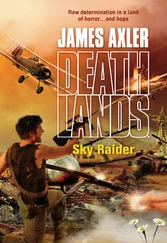Some of the mess had dripped on to Libby, but he was hardly conscious of it, only making a half-hearted move to brush it off. Sitting deep in one of the bucket seats he could see out through the open top and, high above the vision-blurring haze of the permanently suspended dust particles, he saw the interwoven contrails of the helicopter’s fighter escort.
It barely registered with him, but that portion of his mind still functioning on a professional level, told him the number of escorts was just too many for a single helicopter. He would have mentioned it, but felt the battle was no longer any business of his, he was taking no more part in it.
Cline repeatedly struck the top of the radio, with his clenched fist before reluctantly letting Boris remove the side panel to examine it. There were beads of bright fresh metal hanging frozen from most of the components, where solder from the circuit boards had begun to drip in the heat from the tyres immediately below the vital equipment.
‘Did you get the major his air cover?’ Libby wasn’t really interested, just asked for something to say, to break the isolation he felt growing about him.
‘I don’t know. They were receiving, but I didn’t get an acknowledgement’ Cline entered the fact in his log, brushing aside the charcoal black ashes that spread from the edges of the small page across its neatly lined surfaces. He had to cover himself, nothing that went wrong was going to be down to him. The Russian, that was it, if there was an enquiry he’d blame it all on the enemy deserter. ‘What’s your interest, I didn’t think you cared any more, thought you were packing it in?’
For a reason he didn’t understand, Libby found that funny. That was a good one, him not caring, not caring. The trouble was he cared too much; much too much. ‘There’s no need for me to pack it in.’ Standing, Libby stood looking out of the gaping hole where the turret had been, feeling the wind buffet past him as their driver piled on all the speed he could. The Land-Rover was following them again, though now keeping an even more respectful distance, sometimes out of sight half a mile behind them.
Libby felt the laughter rising inside him once more, and fought it down. Him, pack it in? Oh, Cline could be so stupid, so ready to talk first and think afterwards! What need was there for him to give up, or give in? All he had to do was wait and others would do it for him. He had no need to end his battle, when the battle was about to end him.
As he saw them skimming towards the APC at zero feet, their pylons loaded with masses of lethal ordnance, he felt like throwing his arms open wide to welcome, to symbolically embrace the four Soviet Hind helicopter gunships.
Closing his eyes, Libby turned his face to the sky and waited for the obliteration of his existence. Helga was in his mind, on his lips…
Now they had broken from cover it no longer mattered whether or not the Soviet gunships had a hulk-discrimination capability. The APC marked itself out from all the other armoured vehicles strewn about the war-destroyed landscape by being the only one moving.
His hatch had jammed, and Revell had to leave his seat and move back down the compartment to stand and look out through the circular hole where the turret had been. He did so in time to see the helicopters close to two thousand yards and move into line astern to commence their attack run. No manoeuvre their driver could throw the clumsy vehicle through could shake them off. They had only one chance.
‘Bale out and scatter.’
Even before they stopped, the escape hatches were crashing open. This time it was Boris’s turn to be helping someone else, as with assistance from Hyde and Andrea he pushed Libby over the side of the hull, and joined with the others in dragging the protesting man away from the personnel carrier.
From behind the inadequate protection of a curled length of T72 track, Revell could see the front seat weapons operator in the lead gunship hunched over his sights. At any second he would unleash a mass of steel and explosive towards the APC and surrounding area. He knew that by abandoning the carrier they had not avoided death, merely changed its timing and nature.
Not wanting to see their moment of firing, Revell turned his attention to the weaving contrails high overhead, and saw the silver cruciform tip of one transformed by a fireball into a smoke-towing collection of odd-shaped sections of bright metal. Another went the same way. A third Soviet aircraft tumbled from the enveloping smoke of a near miss with dark smoke billowing from its shattered cockpit as it went into a flat spin that, by the violence of the centrifugal forces it imposed, began to wrench first the control surfaces, and then the wings from the stricken aircraft.
The Soviet gunship fighter leader had released only two air to ground rockets when it ran into the solid wall of 30mm cannon shells. Caught by the converging fire from a pair of Thunderbolts, the chopper broke apart and fell out of the sky.
There was little of the second and third helicopter in line to actually reach the ground, as the effects of the pounding fire and the detonation of their ammunition and fuel loads reduced them to little more than fluttering showers of torn and semi-molten debris.
Seeing the fate of the others, the pilot of the last gunship tried to break away, but a snap burst from a high-velocity rotary action cannon sheared off its tail just forward of the rotor assembly. It came down like an autumn seed case, spinning around and around. Engulfed by flame as it crashed, none of the crew escaped.
Above the dead scene of past battles the sky was coming alive, being knotted by looping vapour trails. As the Thunderbolts swept the squad’s immediate attackers out of the way, their covering fighters in turn engaged and harried the Soviet and East German escorts.
Sometimes a parachute would billow close by the smudge of smoke that marked the place where an expensive piece of sophisticated technology had succumbed to the brute result of a warhead’s violent chemical reaction; more often there would be nothing to differentiate the falling bodies of the crew from the other broken parts among which they tumbled.
‘What the hell have we started?’ Open-mouthed, Cline watched a MIG-21 dive straight into the ground under full power, sending a geyser of flame a hundred feet above its point of impact. That dispersed instantly, and then apart from a shallow steaming crater and an odd sunlight-catching shred of metal there was no sign of the aircraft or its pilot.
‘Whatever, we’re taking advantage of it. Round up the squad, get them aboard, we’re still in with a chance.’
The three-dimensional sky battle was becoming more complex, more destructive. Now being conducted at several quite clearly defined altitudes, its original cause was forgotten. While radar homing, TV guided and heat seeking missiles inflicted casualties at the longer ranges, where the opposing aircraft came into closer contact, heavy cannon played their part and sent their share of victims into terminal dives that ended only with devastating impact on the ground, or with the mid-air destruction of the aircraft as fuel tanks or ammunition were ignited by incendiary rounds.
Libby felt cheated, had prepared himself for death and it hadn’t come. It was others, thousands of feet above him, who were finding death. As Burke sent them racing for their lines he watched the aerial combat, had counted nine planes destroyed so far, and had seen as many again break off action and dive for the security of their home bases with flaring wing tanks or damaged jet pipes or gaping holes in their fuselages.
He was aware of Revell watching him, knew the officer had not forgotten the incident at the foundry, and was adding that to what he had witnessed recently. It would be done kindly, Libby knew that, but he was going to be gently but firmly taken away.
Читать дальше
